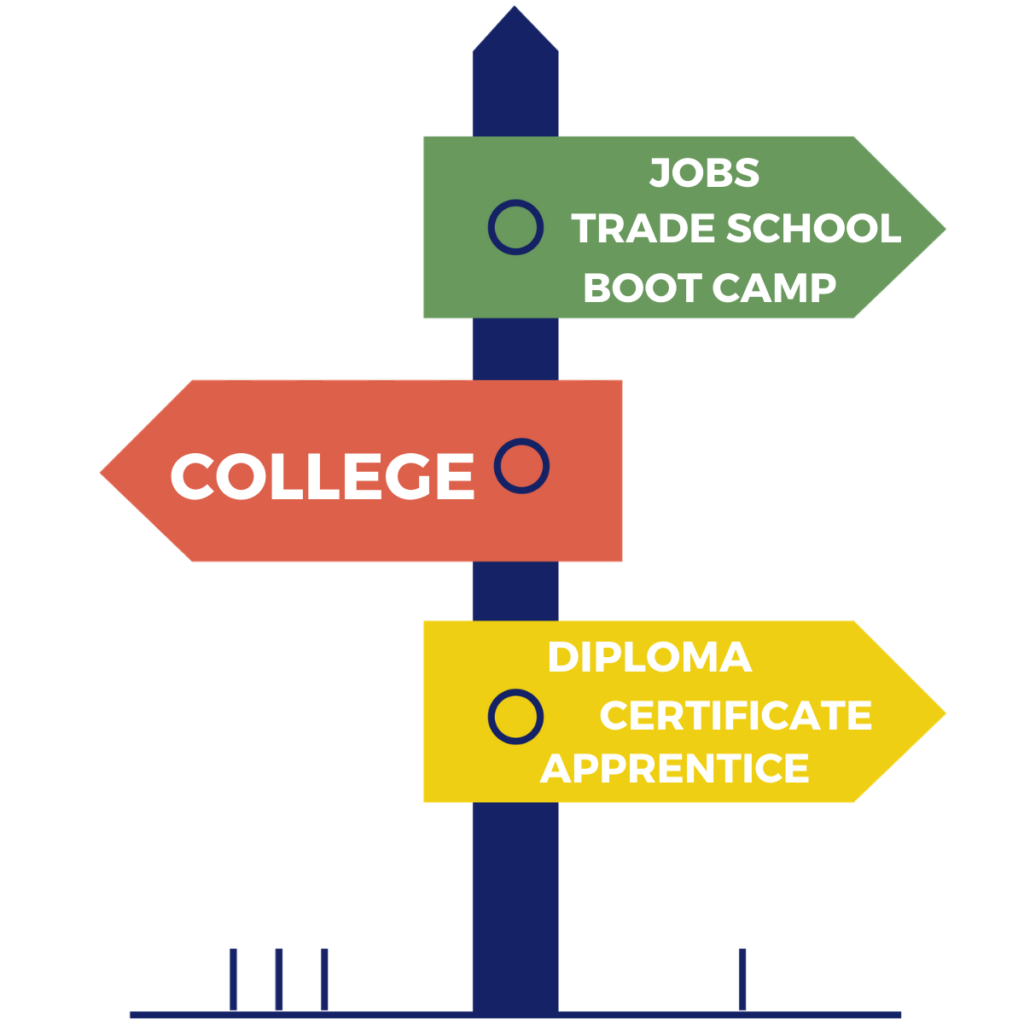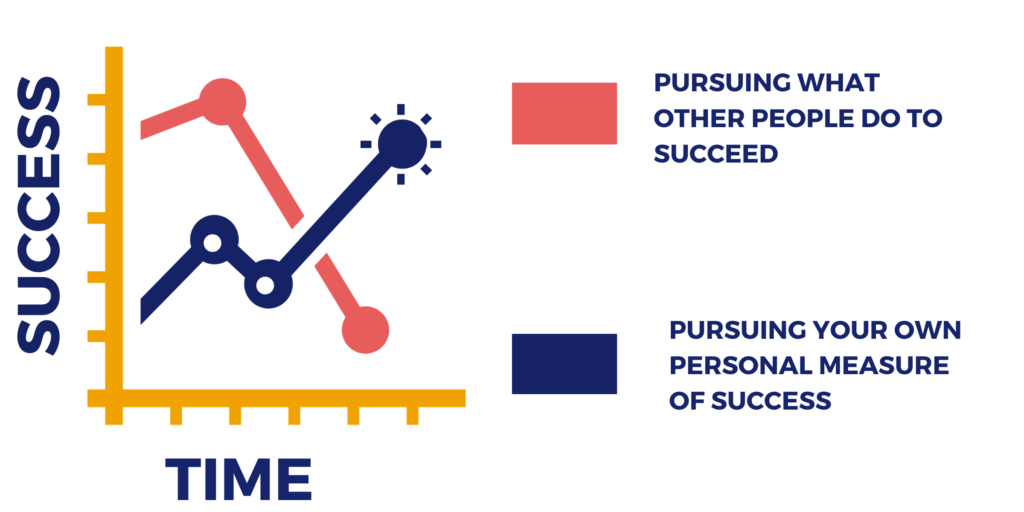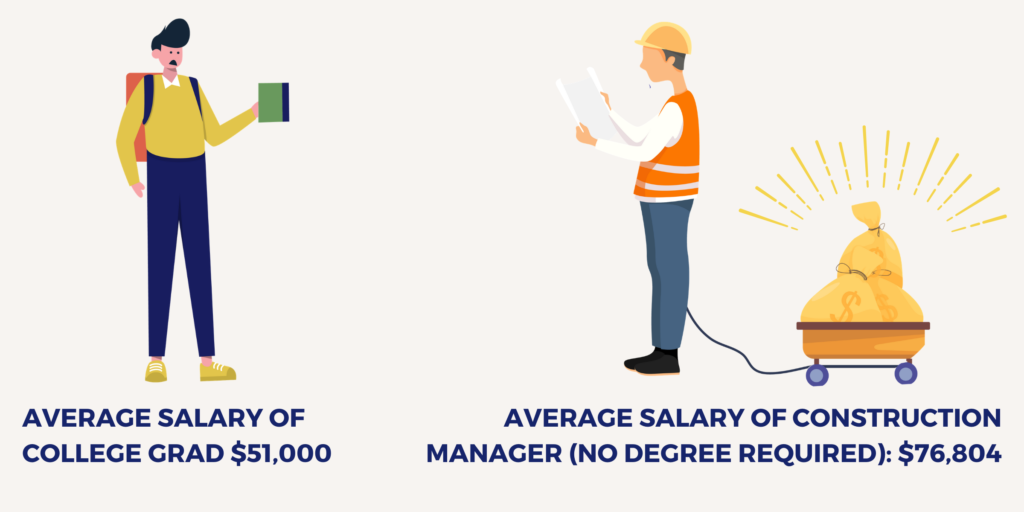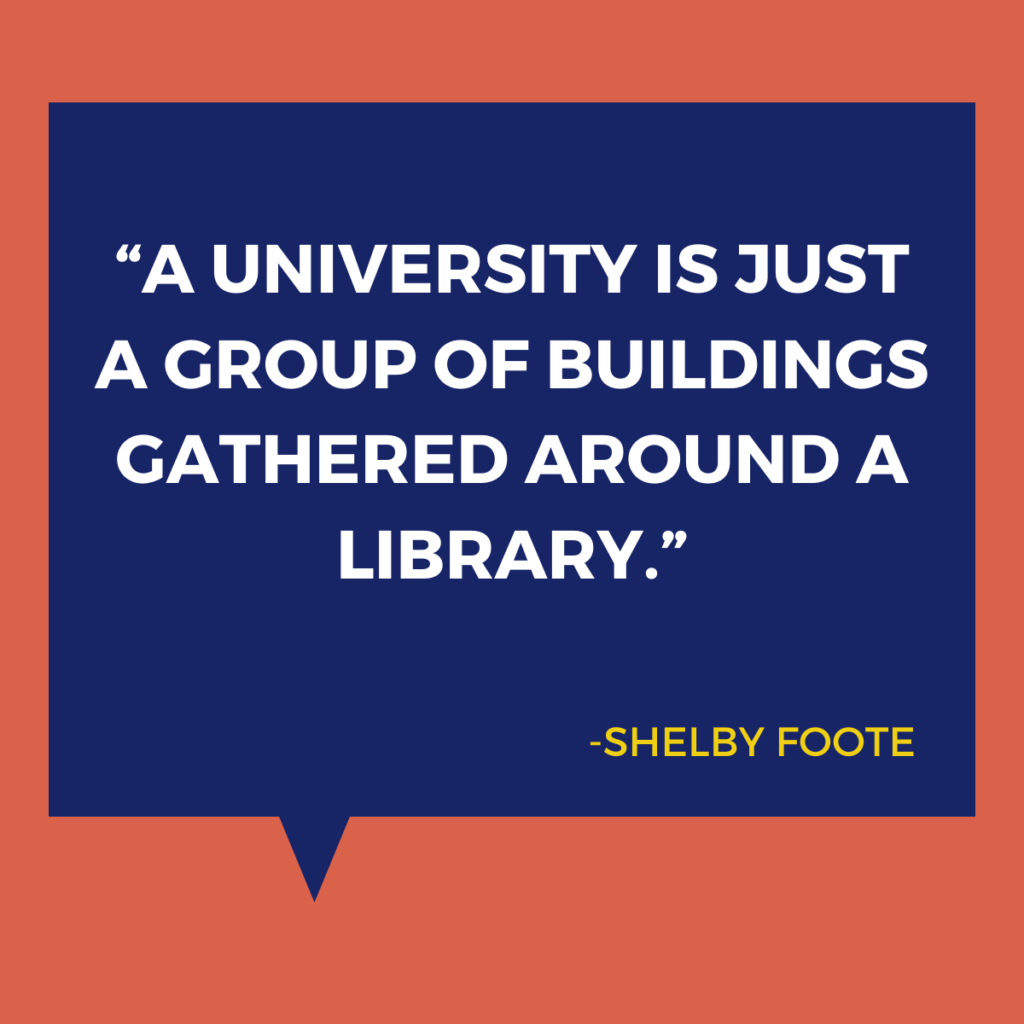
Is College Still Worth the Investment?
Credit where credit is due–before we begin exploring all the amazing alternatives to a college education, let’s look at why this is an important question to answer–and perhaps even more importantly, why it is a question that is not easily answered.
The answer will depend on you–your career goals, dreams, and personality–but luckily for you, this resource is dedicated to helping you figure it all out.
It’s convenient
Whether you are a graduating high school student, or a professional considering a new career move, millions of Americans like you will soon flock to the nation’s colleges. And college prospecting has never been easier, too.
There are thousands of degree programs that tailor syllabi and teaching philosophies to meet all the varying needs of different types of students–from working parents, to advanced students pursuing specialized or even dual degree tracks, to long distance students who will need an online degree program.
It’s mainstream
One of the issues of weighing the traditional college path against alternatives is that college is undeniably the mainstream path. Gone are the days when a college degree was a spectacle of personal achievement–a benchmark of success met only by a small ratio of the country’s over achievers.
Today however, it would seem that there is almost a connotation of underachievement if one chooses to forgo their college education. This statement is not meant to sway readers away from college alternatives, because if you are considering the alternatives you need to be aware of the popular perceptions that might affect you in your career.
It’s got numbers to back it up
If you were to challenge the value of college, its defenders would be quick to cite research. For instance, research suggests that a graduate of a four-year college program will earn a salary comparable to the median high school graduate’s salary at 34 years old. Furthermore, advanced education–specifically in the form of specialized graduate or doctoral degrees–have been shown to further increase earning potentials.
And yet, college might still not be right for you
Even though college is convenient, mainstream, and has research to back it up, you might still achieve greater success if you pursue an alternative that better matches your personality and goals. In this resource, we will explore the various components to deciding whether college is right for you, or if you would be better served pursuing an alternative.
Despite the odds seeming stacked in college’s favor, rest assured that there is plenty of evidence to suggest that college alternatives have some underappreciated strengths and often missed benefits. We will demonstrate this point by answering the following five questions:
- What are the best alternatives to a college education?
- Which professions offer high salaries without requiring a college degree?
- Is the research on college success skewed?
- Which professions value experience over education?
- What are the most lucrative trade schools?

The Best Alternatives to College Education
Before we dive into the most lucrative professions that do not require a college education, let’s look more broadly at what the college alternatives look like. Many will be surprised to learn that there are an impressive number of alternatives to college. While not all of them offer the same security or upper-end salaries as a college education, it is important to note that none of those things are guaranteed by college education either, rather they are only more likely in terms of statistical averages.
After building specialized experience in a trade school, for instance, average earnings can exceed those of college graduates with bachelor’s degrees, and even graduates holding a master’s. We will dive more into this topic shortly, but suffice to say that when comparing college and its alternatives, you should be less concerned with statistical likelihoods and more concerned with what types of success you personally feel confident in pursuing.
For the most part these alternative career paths will begin in one of four places:
- Trade School
- An Apprenticeship
- A Diploma Program
- A Boot Camp
What is trade school?
Trade schools are skill-based education programs that represent one of the largest and most common college alternatives. After graduation many high schoolers enroll directly into a trade school to jumpstart a career as a plumber, electrician, or carpenter. Here’s a more robust list of trade school career paths (Note: the ‘specialist’ indication simply means that are many options for highly specialized career paths within the listed profession; and these specializations often offer the strongest salaries):
- Electrician / specialist
- Real estate agent
- Chef
- Construction worker / specialist / manager
- Dental hygienist
- Paralegal
- Plumber / specialist
- Pharmacy technician
- Carpenter / specialist
- Masonry / specialist
- Nurse / specialist
- Graphic designer
- Massage therapist / specialist
- Herbalist
- Cosmetologist
- Welder / specialist
- Computer technician
- Surgical technician
- Mechanic / specialist
The average earnings of a college graduate with a bachelor’s degree sits around $59,124 while some of the above trade careers offer salaries nearing the six figures with some of the most specialized options breaking into six figure salaries. And beyond trade school, there are other college alternatives as well.
What is an apprenticeship?
Apprenticeships might occur as a necessary hurdle in a trade-skill career, or they might be entirely voluntary programs for increasing earnings and professional mobility. Many electricians, for instance, must undergo an apprenticeship after completing their necessary schooling in order to take on more risky parts of the job. Welders undertake apprenticeships to earn skill-classifications such as a ‘underwater welder.’ Masons pursue apprenticeships to fine tune different skill sets.
Apprenticeships essentially function as the internship in the world of college alternatives. Except apprenticeships are much more focused on building valuable skill sets than they are focused on building resumes. This can be extremely valuable to individuals who wish to demonstrate their professional clout through action and skill.
What is a diploma?
While most readers will probably associate the term ‘diploma’ with a college degree program, diplomas are earned through a variety of programs. Many of them do not require traditional college-type programs and might instead involve combinations of trade schooling, apprenticeships, and real world experience.
Many community colleges offer diploma programs that are designed to get a professional into their designed area of the workforce as quickly as possible. These types of diplomas are excellent options for individuals who just want to get to work as quickly as possible. Established work experience after all often acts as a predictor of success, and so individuals who get to work sooner may be able to reach their goals quicker.
What is a boot camp?
Perhaps the most informal of the group, a boot camp is usually an independent program designed to help someone jumpstart a specific skill set. While these programs are not usually accredited, they do offer hands-on learning through projects which often double as portfolio builders.
Boot camps are popular in areas of computer and data science, sales, and other skill-based professionals. As technology evolves and industries change, professionals are often called to build a new skill set with which they have no experience. Boot camps serve as the springboard for helping professionals meet the ever-changing demands of their field.

The best alternative to college is the path that best suits you as an individual
Before we dive deeper into the financial incentives for diving into college alternatives, one of the fundamental rules of this guide is as follows: you will be more successful pursuing a career that takes advantage of your strengths rather than pursuing a field–which you are weak at–just to pursue higher salaries. If you are lucky enough to have personal strengths that align with the skill-based trades that offer the highest earning potential, then you may find that the best choice for you is a college alternative.
A continuation of this point is that education is universal. If you dislike learning and education, you will likely be disappointed that many trade schools, apprenticeships, and similar professional programs involve education in some form. In this sense, there are no real alternatives to education. If you have decided that you dislike classroom settings and traditional education, be sure to pay attention to the trade careers listed in this guide that require the most hands-on learning and the least classroom time.

The Highest Paying Professions that Don’t Require a College Degree
Let’s look at some of the highest paying professions where you won’t need to go to college to find financial success. We will break this down into ‘10 of the best paying trade school professions’ and ‘10 of the best paying professions that don’t require college degrees.’ While there is certainly some overlap between the two, the point is that the first list explores professions that require professionals to enter trade school at some point, while the second list explores professions where you might only need an associate’s degree, a professional certification, or might not require any schooling at all.
10 of the Best Paying Trade School Professions
- Air Traffic Controller – Average Pay: $88,744
- Aircraft Mechanic – Average Pay: $87,102
- Elevator Mechanic – Average Pay: $80,537
- Construction Manager – Average Pay: $76,804
- Dental Hygienist – Average Pay: $75,438
- Multimedia Animator – Average Pay: $75,270
- Electric Power Lineman (Installation and Repair) – Average Pay: $65,700
- Fashion Designer – Average Pay: $65,221
- Underwater Welder – Average Pay: $64,486
- Web Developer – Average Pay: $59,578
10 of the Best Paying Professions that Do not Require a College Degree
- Network and Computer Systems Administrator – Average Pay: $83,510
- Business Intelligence Analyst – Average pay: $76,402
- Computer Security Analyst – Average Pay: $75,883
- Diagnostic Medical Sonographer– Average Pay: $68,750
- Occupational Therapist – Average Pay: $65,418
- Database Manager – Average Pay: $65,138
- Computer Programmer – Average Pay: $63,241
- Radiologic Technician – Average Pay: $62,280
- Service Delivery Analyst – Average Pay: $56,433
- Computer Support Specialist – Average Pay: $54,760
The Key Takeaways
- Skill, specialization, and talent are the main vectors of the high financial compensation listed above.
- The only cases where these professions do not require trade schooling, an associate’s degrees, or some other form of education is when success within the profession can be achieved by sheer talent alone. If your communication skills and skills of analysis are extremely high, for instance, you might find tremendous success in an intelligence or analyst position.
- Many of these professions can be broken into with a select skillset, which you can target through a boot camp, apprenticeship, or self-teaching.
- Every profession in this ranking seemingly values experience and skill over traditional college education.

The Bias of College Education
We’ve looked at some of the best alternatives to college education and the tremendously lucrative professions they can lead to, but let’s also take a look at the college bias in America. First and foremost, it is important to note that colleges and universities are a business, and so it is their prerogative to promote the positive and stymie the negative, and there is nothing inherently wrong with that.
The problem is when the general public forgets this bias, and wrongly assumes higher education marketing has no bias. So let’s take a look at how the favoritism of higher education is based on some core misunderstandings.
College success rates
- When research comes out that says, ‘college graduates are more successful than high school graduates’ they are making several mistakes as social science researchers.
- Firstly, they are comparing all of college graduates with all of high school graduates, which is a mistake.
- They should be comparing college graduates with only a portion of the most driven high school graduates. This is because college by itself is a sort of filter for the drive and the success-minded. Students only enroll in college when they have at least some drive for achievement and success. While many of those who graduate high school simply do not care about reaching success, landing high-end salaries, etc.
- For the research on college success rates to be compared to non-college graduates, researchers would need to filter out the pool of undriven high school graduates.

The student debt problem
- As of 2019, federal student loan debt reached about $1.6 trillion in outstanding debt.
- Student debt has increased by over 100% in the last decade alone.
- Student debt is carried by over 43 million American adults, roughly one-sixth of the population.
- The problem is that degree programs keep increasing in cost, while many job sectors have decreasing growth and decreasing salaries. Meaning not only are they more competitive, but you will be paid less even if you beat the competition.
- Many college students spend literal decades paying off their student loans, only to find they are working side by side with professionals who skipped college and have no debt.
- For these reasons, skirting the astronomical student debt of college might be the single strongest argument for seeking a college alternative.

Careers that Reward Experience
When considering alternatives to college, one of the principles you need to be aware of is the relationship between education and experience. If the upper tiers of your desired profession are dominated by professionals with doctorate degrees and decades of experience, you need to be aware of the fact that you probably cannot compete against them with experience alone. While it might be possible, it would not be good advice for this guide to recommend it.
Instead look for professions where experience, skill, and talent dominate the industry. You will have to do some research of your own to figure this out, because each industry varies too greatly and is too unique for us to give some generalized rule. But these questions will help you along the way:
- Do jobs within your desired profession require both a degree and work experience, or is there an obvious favoring of one over the other?
- Are the individuals at the top of your desired profession advanced degree holders?
- Are there young managers, who hold no degree overseeing older professionals with degrees?
- Is there room for entrepreneurism in your desired profession? (Is there innovation, and invention, or is the profession too traditional?)
- Do employers within your desired profession send their employees to boot camps to learn certain skills?
- Find your ideal employer, and reach out to the human resources department directly; ask them if their company values experience over traditional college education.

Top Reasons for Choosing an Alternative to College
We’ve covered some of the best alternatives to a college education–the different types of education, the lucrative careers they lead to, and the various benefits. So now it’s time for college education to go head to head against the alternatives. Let’s look at some of the best reasons for choosing an alternative to college education.
Mobility
One of the best reasons to choose an alternative college is that you will have greater mobility professionally. When you commit to college you commit to undertaking an enormous expense that will likely eat up more than 4 years of your life, if you count the research and application process.
When you choose a trade school, associate’s degree, or apprenticeship or boot camp however, you are committing to something with a much faster turnaround and a miniscule financial burden in comparison.
This means that whether you are a prospective student of trade school, or an established professional, you can get the training you need without skipping a beat. Many trade schools expect parallel full-time occupation, and so you can simultaneously work on increasing your prospects of success without leaving the workforce or surrendering valuable time that might have otherwise counted towards your work history.
Risk
As mentioned above, college education has many benefits but they come with a heavy price of both time and money. This confers an enormous risk to the college student, because the process assumes the student is only making correct choices.
If say, the college students enters the work force and finds the industry struggling financially, or worse, finds out that the work is simply unfulfilling, then they are simply out of luck–and will start over from roughly the same place as where they began.
In a skill-based profession however, a professional is always building on what came before. The same problems might arise from a job market taking a hit economically, or finding a lack of fulfillment–but it is much less likely for there to be surprises when the tradeskill student enters the job. This is because trade schools work in tandem with real world industry demands, and a student’s day to day activities will closely mirror their daily life in their careers.
Moreover, should the worst happen and a professional finds that their investment in a trade skill has gone awry, at least they will not have invested four years and tens of thousands of dollars.
Is College or an Alternative Right for You?
As stated at the beginning of the guide, answering this question will depend largely on questions that only you can answer–depending on your goals, personality-type, and the demands of your profession. With that in mind, hopefully we have made that process more simple by demonstrating all the amazing opportunities available to you outside of a college education. Even if you detest the idea of a college education, it might still be the best option for you given the demands of your desired profession.
But it might also be the case that you have a choice between either option–college or various alternative paths. With student debts rising, job markets becoming notoriously unpredictable, and with skill sets being increasingly valued by employers, the days of college-supremacy might just be coming to an end. Thankfully, college alternatives offer everything you need.